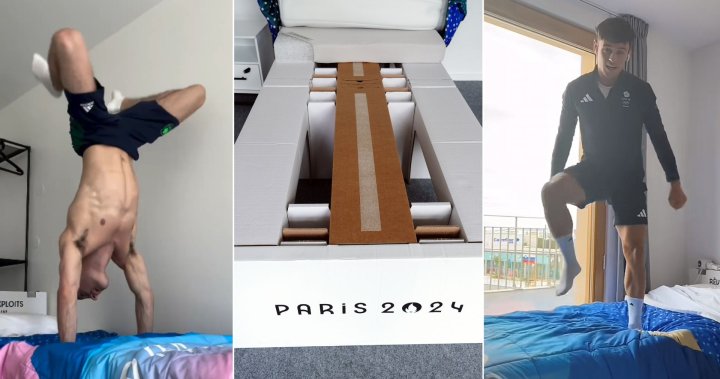Despite this year’s summer Olympics being held in the City of Love, there isn’t anything romantic about the cardboard beds international athletes are sleeping on.
The beds, twin-sized and made from several folded pieces of cardboard topped with a mattress, first debuted at the 2020 Tokyo Olympic Games. In Japan, and now also in France, the cardboard bed frames are used as part of a sustainability initiative to decrease the environmental footprint of the Games.
During the Tokyo Olympics, which were postponed until 2021 due to the COVID-19 pandemic, some athletes and spectators called the cardboard furniture “anti-sex beds,” and suggested that their true purpose was to prevent canoodling in the Olympic Village.
At the time, athletes including Irish gymnast Rhys McClenaghan posted videos testing the strength of the supposed anti-sex beds by jumping up and down on the mattress.
A spokesperson for the Olympic Games replied to McClenaghan’s video on X, then called Twitter, and thanked him for “debunking the myth.”
This month, the Olympics said on TikTok that their cardboard beds are made from “sustainable” materials and are “100 per cent made in France.” There are three versions of the bed athletes can choose from, with varying firmness and size.
Already, some 2024 Olympic athletes have poked fun at the cardboard beds online, again testing out their structural integrity.
The email you need for the day’s
top news stories from Canada and around the world.

Get daily National news
Get the day’s top news, political, economic, and current affairs headlines, delivered to your inbox once a day.
British diver Tom Daley gave his followers a tour of his cardboard bed on TikTok, and even jumped on top of the mattress to prove its viability.
McClenaghan again tested the cardboard beds in Paris, this time doing flips and handstands on the mattress to prove the “anti-sex” conspiracy is fake.
Not everyone has been thrilled with the cardboard beds, however.
Australian water poloist Matilda Kearns called the bed “rock-hard” on TikTok and complained the sleeping arrangement was uncomfortable.
In the days afterward, Kearns said her team manager purchased mattress toppers to make the experience cozier.
Among other living choices in the Olympic Village, organizers opted to not include air conditioning as part of this year’s effort to make the Paris Games the greenest ever. Regardless, several countries, including Canada, have already revealed that they will be bringing their own portable air conditioning units to Paris to keep their athletes cool.
The Olympic Village will house more than 15,000 athletes and sports officials during the Paris Games, which will run from July 26 to Aug. 11.
© 2024 Global News, a division of Corus Entertainment Inc.






